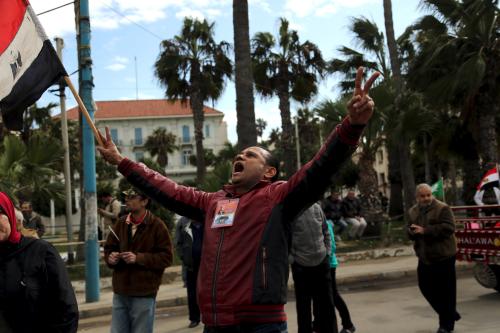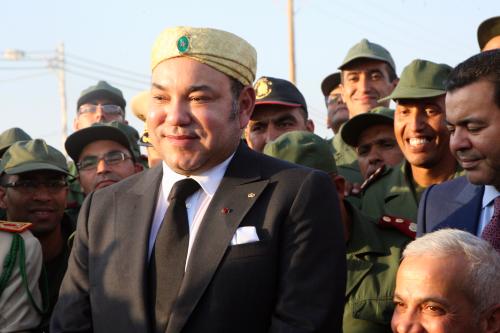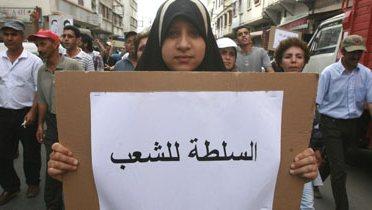Protests have erupted across Morocco over the last few days following the death of fish seller Mouhcine Fikri. The incident is reminiscent of the events sparking the Arab Spring, but differs in important ways, writes Sarah Yerkes. While these protests should be taken seriously, they are unlikely to escalate. This post originally appeared on Lawfare.
The ongoing protests in Morocco, sparked by the death of a fish vendor last week, have led some to speculate that Morocco might be on the verge of a second Arab Spring. The uprisings that began in Tunisia in December 2010 and spread across much of North Africa and the Middle East share many similarities to the Moroccan protests. Yet there is one major difference between 2010-2011 and today—hindsight. While the promises of the Arab Spring quickly faded across the region, the popular revolts left one lasting legacy: a fundamental shift in the relationship between the governments and the governed and a recognition by Arab leaders that they, too, might suffer the fate of Hosni Mubarak or Moammar Gadhafi.
The parallels between Mouhcine Fikri, the Moroccan fish vendor, and Mohammed Bouazizi, the Tunisian fruit seller whose death started the Arab Spring, are numerous. Both come from poor, marginalized regions of their respective states. Both suffered from mistreatment by the authorities that threatened their livelihoods. And both of their deaths resonated with many of their compatriots who saw their situation as representative of a larger problem of inequality, corruption, and injustice at the hands of the state.
Yet despite these similarities, Fikri’s death occurred in a dramatically different context from that of Bouazizi’s death. Prior to 2011 most authoritarian regimes in the region allowed for minimal forms of political expression, believing they had complete control over their citizenry. Today, Arab leaders have developed a clear understanding of the ability of the people to demand and execute change, and thus, with the notable exception of Tunisia, the Middle East and North Africa region has seen a closing space for expression and a pushback against all forms of political opposition. While the shared political and economic grievances that propelled the Tunisian protests across the region still exist, rather than enact measures to improve economic performance, reduce corruption, and ensure equality for all citizens, many Arab states have instead focused on preventing and containing dissent. Frequently using security as a justification, Arab governments have enacted a variety of legal measures criminalizing protests, inhibiting the media, censoring the Internet, and stifling civil society. And though these measures so far have effectively prevented a second wave of popular uprisings akin to the Arab Spring, they are, in reality, a band aid over the gushing wound of frustration and grievance experienced by many in the region.
How will Morocco Weather this Storm?
This wave of protests is likely to subside with little lasting effect for multiple reasons. First, the Moroccan government is experienced in handling protests, as evidenced by the Arab Spring. Though Morocco did not witness the same level of protest in 2011 as Tunisia and Egypt, starting in February 2011, tens of thousands of mostly young Moroccans carried out a series of protests in more than 50 towns across the country calling for a limit to the king’s power and the election of an empowered parliament. Morocco was also able to control the size and scope of the uprisings due, in part, to its tradition of protests. Unlike some of its North African neighbors, the Moroccan government had allowed regular protests activity as a pressure-release mechanism and was therefore seasoned in protest control.
This current wave of protests reflects that experience. The Moroccan police have not interfered in the protests, and the government has so far made all the right moves to prevent the protests from turning violent or spiraling out of control. The king ordered a thorough investigation into Fikri’s death and sent the Interior Minister to deliver his personal condolences to Fikri’s family. Interior Minister Mohamed Hassad even issued a statement expressing solidarity with the protesters, “No one had the right to treat [Fikri] like this…We cannot accept officials acting in haste, anger, or in conditions that do not respect people’s rights.”
Kings generally fare better than presidents during times of upheaval.
Second, the Moroccan political system is under a lesser level of threat than the 2011 Tunisian or Egyptian governments, because it is a monarchy. While during this week’s protests, some have called for the end of the makhzen (Morocco’s ruling elite), they have refrained from directly criticizing the king. Kings generally fare better than presidents during times of upheaval, and even more so than other monarchies in the region, King Mohammed managed to stay above the fray during each wave of protests due both to the innate legitimacy afforded him by his dual position as head of state and religious leader (emir al-mu’minun or commander of the faithful) and by the protection he garners from his large and loyal network of regime allies.
Regardless, the current wave of protests in Morocco should not be taken lightly. They are a reminder to the king and the government that the grievances that came to light almost six years ago are still there. More importantly, they suggest that the measures put in place to quell the 2011 protests (including a new constitution and some devolution of power) are insufficient to address the deep economic and political challenges facing Moroccans. So far, the Moroccan government—from the local prosecutor to the king—has taken positive steps to address the specific incident of Fikri’s death. On Tuesday, Moroccan officials arrested 11 people related to the case including security officials, and the prosecutor announced that a preliminary investigation suggests the death was the result of an involuntary homicide. But while a conviction might provide comfort for Fikri’s family, it would only be another band aid for the issues fueling the protests. And failing to address the underlying issues—corruption, police brutality, and the economic marginalization of Morocco’s rural regions—will make it impossible for the band aid to hold.
The Brookings Institution is committed to quality, independence, and impact.
We are supported by a diverse array of funders. In line with our values and policies, each Brookings publication represents the sole views of its author(s).








Commentary
Why Morocco’s protests won’t usher in another Arab Spring
November 2, 2016